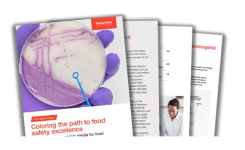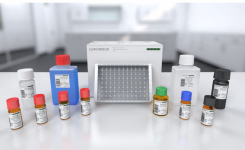Affymetrix Developing DNA Microarray for Identification of Biodefense Pathogens
go back to news archivesAffymetrix, Inc., will be developing a biodefense microarray test that can detect hundreds of top-priority bacterial and viral biological threats, such as anthrax and plague. The new test, funded by a $2.1 million dollar National Institute of Allergy and Infectious Diseases (NIAID) grant, is expected to offer researchers the quickest, most comprehensive single test yet for biodefense.
Current DNA tests require a time consuming trial-and-error approach, testing for one pathogen at a time. Traditional test methods -- growing a culture of the bacteria and then identifying it by sight -- can overlook genetically engineered organisms.
The new arrays -- which are expected to work in as little as four hours -- offer three advantages over old testing methods:
-- The biodefense array will offer a comprehensive, single-step test to simultaneously identify genetic fingerprints for 26 different bacterial species, 10 viral species, and hundreds of their subspecies selected from the NIAID high-priority pathogen list. As a result, this array could take the place of dozens of existing tests. It could even detect an attack where multiple pathogens are used, something current methods may not detect.
-- The biodefense array will detect DNA from a deadly pathogen that has been inserted into an apparently harmless bacteria -- something traditional pathogen identification methods could miss. For instance, if a section of plague DNA was inserted into common E. coli bacteria, traditional tests might only detect the E. coli, missing the newly engineered pathogen and allowing the threat to go unchecked. The microarray will test for 56 different toxic genes from bacteria.
-- The biodefense array will detect whether or not genes that make organisms resistant to antibiotics have been inserted into a pathogen. If an antibiotic resistance gene goes undetected, doctors could end up treating patients with medication that simply wouldn't work. Using current methods, researchers have to test for every antibiotic resistance gene one at a time, a slow and cumbersome process. The microarray will simultaneously test for 62 different antibiotic resistance genes.
This single comprehensive test is possible because of recent advances in Affymetrix GeneChip(R) microarray technology that enable researchers to analyze millions of different DNA strands on a chip the size of a thumbnail.
While the most pressing need for this technology is in biodefense, the ultimate application will be in the doctor's office. Similar Affymetrix arrays could be used to identify hundreds of more common, naturally occurring pathogens, such as streptococcus or hepatitis, enabling doctors to determine quickly the type of illness a patient has.
Researchers expect to have a prototype array in three months. A multi-pathogen array is expected to be commercially available within three years. The Affymetrix resequencing technology used in this array is identical to that used in the Affymetrix SARS and small pox virus arrays developed earlier this year.
Source : Affymetrix, Inc. View archived contact details
Posted on October 25, 2004
















